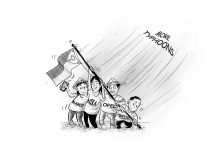
THE SEARCH and rescue operation for the missing submersible Titan in the Atlantic Ocean gripped the world. Led by the US Coastguard, responders from Canada, France and the United Kingdom pooled their resources and expertise to locate the Titanic-bound sub and eventually ascertained – in record time, if we may say; considering the vastness of the ocean and the teeny-weeny size of the sub, it was like looking for a needle in a haystack – that the Titan suffered a catastrophic implosion, killing all the five people onboard.
We can’t help but look at our own Philippine Coast Guard (PCG). Every time there is a sea disaster, we focus our attention to the coastguard. Are the expectations for it to do well equal to the powers it is vested with?
The PCG must enforce laws, promulgate and administer rules and regulations for the promotion and safety of life and property at sea and the protection of the marine environment and resources. It must render aid to persons and vessels in distress and conduct search and rescued in case of marine accident within the maritime jurisdiction of the country. It must enforce and assist in the implementation of laws on fishery, immigration, tariff and customs, forestry, firearms and explosives, dangerous drugs, trafficking of women and children. It must enforce and assist in the maintenance of maritime law enforcement and security based on the applicable laws.
At present, however, our coastguard exists in limbo. It is an attached service under the Department of Transportation and Communications but in times of war, as declared by Congress, it can – or parts of it – be attached to the Department of National Defense.
Is it possible to make the PCG a separate and distinct uniformed commissioned service? And how many personnel does PCG have? Are they enough to service a country with 7,100 islands?
With more teeth, the PCG will not have excuses for performing lousily. Congress could provide real and enduring help by strengthening the Philippine Coast Guard law. PCG’s stability and permanence as a distinct, sea-going, uniformed commissioned service can enable it to develop its own fleet and personnel that is responsive, reliable and effective.



